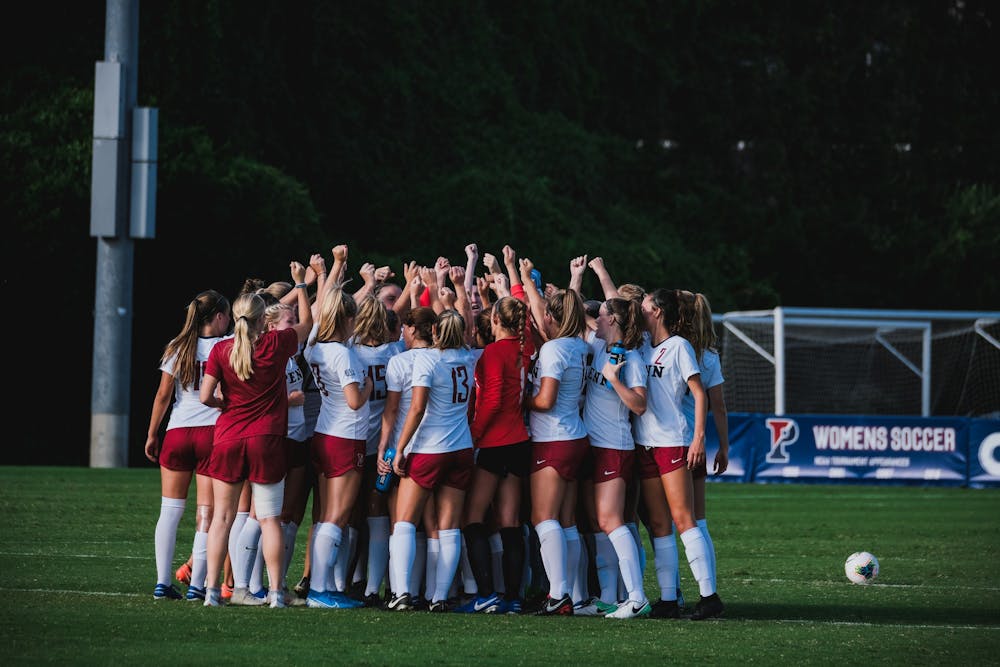
Despite not having a fall season, Penn women's soccer is keeping busy under first-year coach Casey Brown, with a personalized training plan and guest presentations for the players' benefit.
Credit: Son NguyenWhile Penn’s fall sports teams didn’t have much competition to look forward to, many of them at least had plans to reunite in some capacity this fall. Penn’s most recent announcement about COVID-19 has rendered it practically impossible for this to happen.
On August 11, Penn announced that it would not be inviting students back to campus this fall due to a rising number of COVID-19 cases across the country. Penn President Amy Gutmann and Provost Wendell Pritchett also encouraged students living off campus not to return to Philadelphia.

This July, the Ivy League became the first NCAA Division I athletic conference to cancel sports until January 1, 2021. Since then, other conferences have followed suit. Despite canceled competition, Penn teams still had plans to run practices, albeit in modified form.
“The Ivy League and Penn have done an amazing job at really having a set of standards and phases for us to get [back into] and progress through different training,” women’s soccer coach Casey Brown said. “Even more recently in the past couple of weeks, we’ve all been planning both for our athletes and all students to return, but also the ins and outs of what that was going to look like in terms of [our] approach to training.”
For a sport like women’s soccer, for example, fall training would likely have occurred in four phases. The first would have entailed testing and clearing athletes to play. The second would have included virtual team meetings, as well as socially distant strength and conditioning sessions. The third phase would have progressed towards skill instruction and allowing the athletes time to actually work with the ball, heading in the direction of the fourth phase, which could have allowed for contact and games.
Penn’s decision to limit student interaction has put an end to hopes of in-person fall training.
“I think with the latest University communications sent out, I don’t believe that we’re going to be able to have any formal training,” Brown said. “The University is making tough decisions, but [it's] making those decisions based on what [it] feel[s] in terms of being able to provide a safe environment.”
Penn women’s soccer is now in the same position as other women’s soccer teams in the Ivy League, who have known for a while that they wouldn’t be able to reconvene this fall due to their respective universities' policies. In the Ivy League, administrators are implementing policies that will make learning mostly remote and will limit the number of students who are on campus during the fall.
“I think everyone is in different places, but I think it’s all trending towards this. I think we’re all going to be in a similar boat,” Brown said. “There’s so much craziness and inconsistency across the entire country right now, and I think the best thing [we can do] is trust the leadership, trust that it is making the best decisions for the health of our students and student athletes.”
Brown has once again modified her plans for the Quakers’ fall training.
“We’re going to come up with programming for our team through this semester. … While we’re going to be remote learning, we’re going to have a real consistency with our team in terms of getting on Zoom calls. That’s going to be a range of different programming, from continued getting-to-know-yous … to different team tactical, chalk talk video-type things,” Brown said.

Brown plans to engage the team with different speakers and presentations from alumni. She also noted that there will be a fall training plan, similar to a summer training packet, that she will suggest the Quakers follow in order to maintain their fitness with hopes of competing in the spring.
Brown was hired as head coach for the Quakers just this past March, following the resignation of coach Nicole Van Dyke to work at Pac-12 power Washington. Brown pointed out that everything she has done with the team has been remote so far and that she hopes they will grow from this experience.
“I think there are silver linings. This is going to be the most adaptive group we will ever have. They have already proven to be extremely resilient, so I think there’s a lot of silver linings for the type of team and team culture that I want to foster,” she said. “Obviously we wish we could be competing and be out there, … but I think while the motive is going to be different, I’m thinking as a coach ‘how are we going to create similar areas of growth just via Zoom?’”
For now, Penn women’s soccer, like many teams at Penn and across the country, must continue to hope that the pandemic will subside so that it can compete this coming spring.
The Daily Pennsylvanian is an independent, student-run newspaper. Please consider making a donation to support the coverage that shapes the University. Your generosity ensures a future of strong journalism at Penn.
Donate







